The European and international protest movement against deteriorating conditions in the education system reached a new high point on Tuesday, November 17, with almost 100,000 students, pupils, teachers and parents taking part in protests and demonstration throughout Germany.
Thousands of students and school pupils took to the streets in Berlin, Munich, Cologne, Wiesbaden, Düsseldorf, Duisburg, Essen, Bielefeld, Göttingen, Hanover, Freiburg, Heidelberg, Karlsruhe, Nuremberg, Augsburg, Regensburg and many other cities. For many of those participating, it was their first experience of a demonstration or political protest.
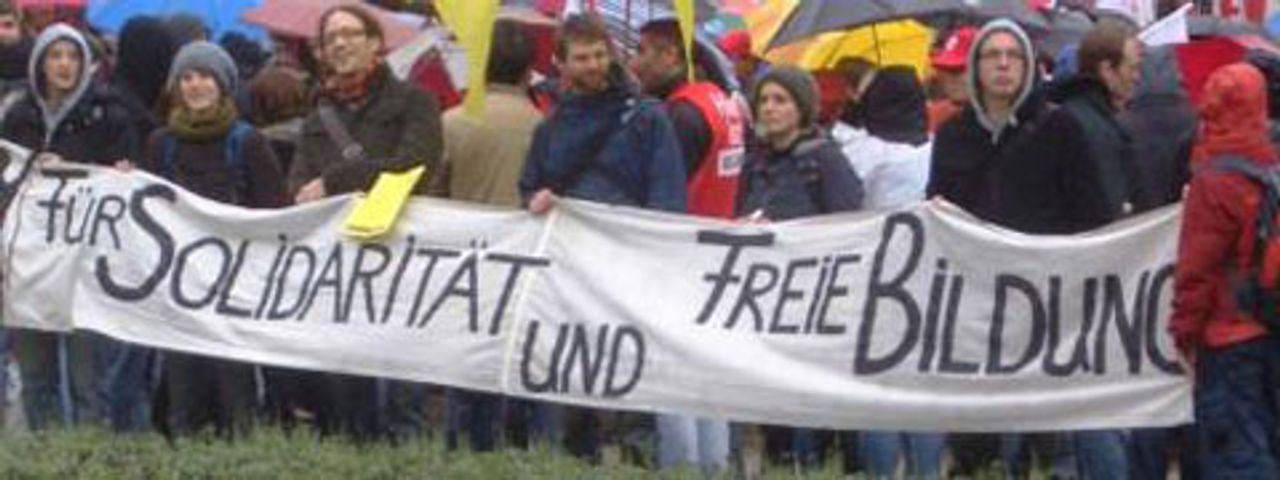 Banner in Wiesbaden calls for free education
Banner in Wiesbaden calls for free educationThey carried banners and posters demanding “Equal chances” and “Free education for all! ,” “Education is not commodity!” “Delete the elite!,” and—in a more ironic tone—”Rich parents for everybody!”
The most important demand was the abolition (or non-introduction) of study fees. In many German states, students now pay between €500 and €1,000 per term—e.g., at the University of Duisburg-Essen, where they must shell out €680 per term.
In addition, students protested against the European-wide introduction of a bachelor’s degree system, which forces them to cram an enormous quantity of material in just three years—at the expense of proper scientific study. The demonstrators demanded a higher education free from time limits and competitive and peer pressure.
“The universities are deteriorating into factories for learning,” said one student from Frankfurt. Only a small proportion are able to go onto master’s study. Pupils and teachers at secondary schools criticise a similar development, whereby the school period is to limited to eight years.
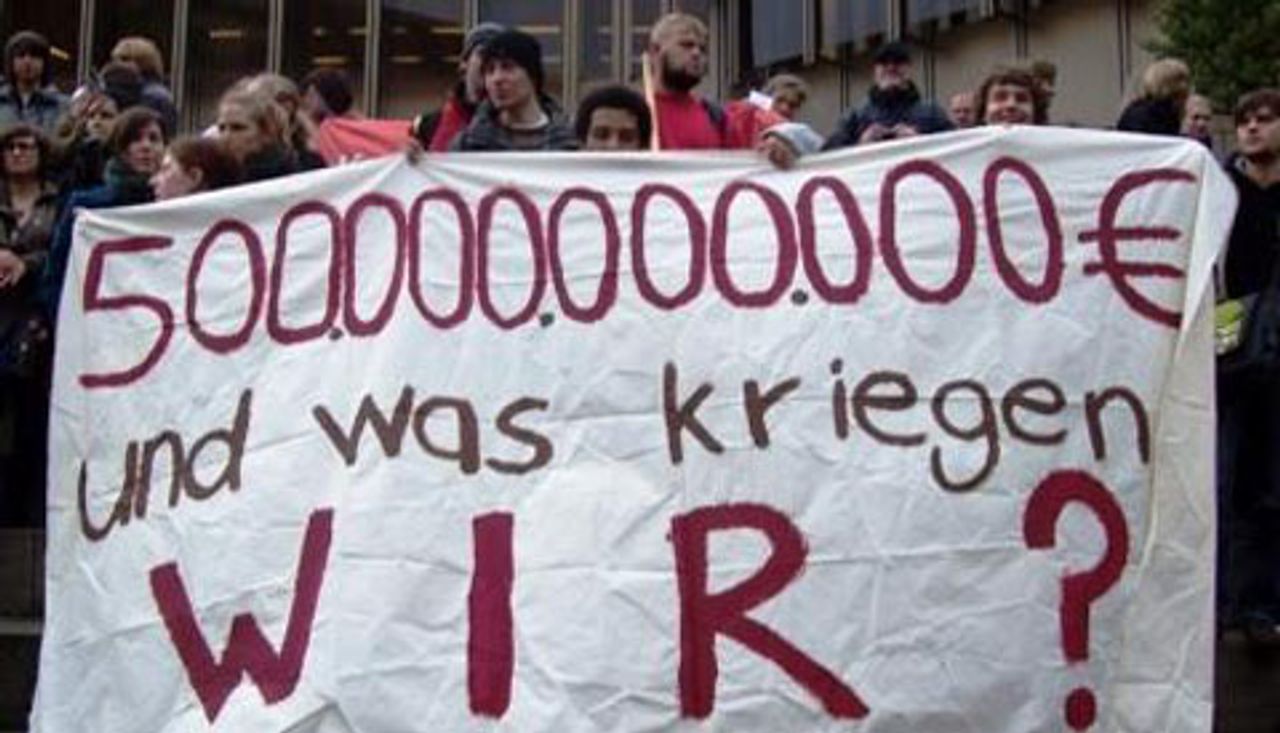 Students at Bielefeld
Students at BielefeldReferring to the billions in taxpayer money given to the banks, one student banner in the town of Bielefeld read, “€500,000,000,000 and what do we get?”
“We students are slowly losing patience,” said Narjara Wandel, who is taking a bachelor’s degree course in social work at the University of Duisburg-Essen. “Study fees are an insult,” she explained. “For many it is a reason not to study at all. It is an enormous burden for students. I pay €480 study fees and €200 social insurance contribution per term. Like many others, this money is not covered by any student financial assistance. When one includes extra costs for studying—photo-copying, books and other materials plus living costs such as rent, food, electricity, telephone, internet—there is not much left.”
Najara is of course compelled to work in her term holidays. “During the term, I am able to work on the side. The master’s degree and bachelor’s degree courses of study are rigourously scheduled. There is a predetermined time table and barely any options. I have at least 20 hours of seminars and lectures per week, plus seminar papers, homework and three examinations per term.”
Since the introduction of the study fees, many students have been forced to find part-time jobs and many other young people think twice about beginning study at all.
Many students told of the unacceptable conditions that prevailed in their course of studies. Mark, from the college of further education in Frankfurt, declared, “An academic year for the course I am doing is appropriate for between 40 and 50 people. In fact, at present, there are 171 students subscribed for the course! Because there are not enough lecturers and professors, 80 students cram together in lecture rooms that have been designed for 20. In addition, many teaching hours simply do not take place.
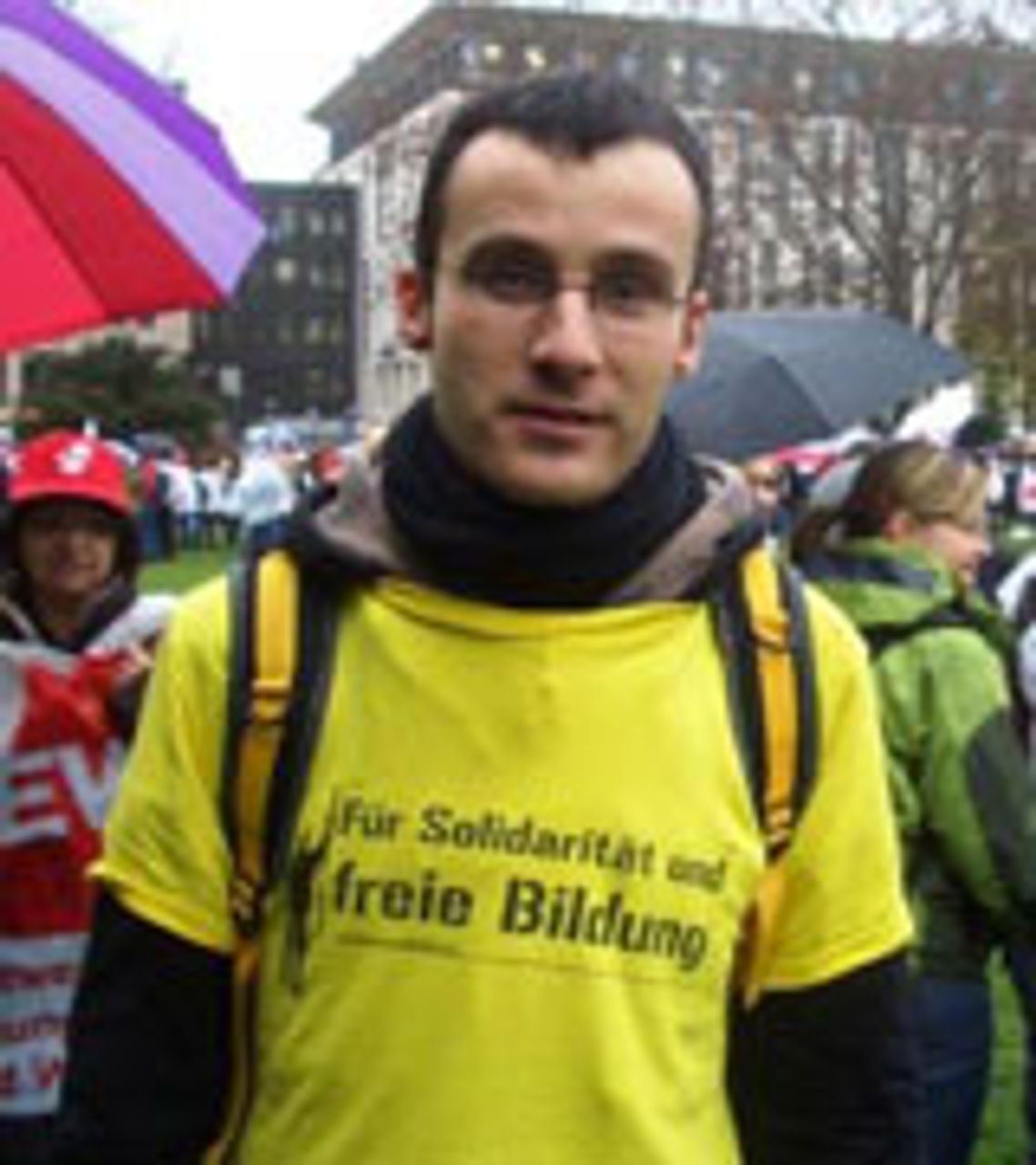 Mark from Frankfurt
Mark from Frankfurt“Education should be free for all,” Mark said. “We are strictly opposed to study fees and are demanding free transport tickets for students and free school books.”
Mark sees a link between the student protests and the current struggles by workers against dismissals and wage cuts. “Education must be made available for all—irrespective of social origins or from what social layer one comes. It is the key to later success. In my opinion, the solidarity between pupils and workers is important.”
 Martin from Marburg
Martin from MarburgMartin, from the Elizabeth School in Marburg, commented, “We must oppose every attempt to commercialise education.” He is completely opposed to the shortening of the period at school—i.e., cramming 13 years of material in 12 years. “This is the stress that my sister currently has to endure,” Martin declared.
With regard to the WSWS leaflet, which was distributed in large numbers at many of the demonstrations, Martin declared, “I absolutely agree with the demand that you raise in your leaflet for links to be established with workers.”
Many students are also concerned about the situation confronting them after their studies. Lutz, who studies mechanical engineering in Munich, declared, “It is not just a problem with education policy. One is worried about what happens after our studies finish. My cousin has been unemployed now for nearly a year and has little prospects of a job because of the economic crisis. Soon he will probably be forced onto the Hartz IV welfare payments.”
When asked if he saw a connection between the government’s educational policy and the attacks on wages and working conditions, Lutz answered: “The big banks and finance houses were helped out of the lurch with taxpayers’ money, while the population at large is being left to its own devices.”
In Munich, the main auditorium at the city’s Academy of Performing Arts has been occupied since November 5, and students there have conducted a number of solidarity actions and meetings with students protesting in neighbouring Austria. In Austria, a number of universities have been occupied for weeks. “Our university is also burning,” said one of the posters in Munich—alluding to the main slogan of the Austrian protest movement. Last week, lecture halls at the city’s Ludwig Maximilian University were also occupied.
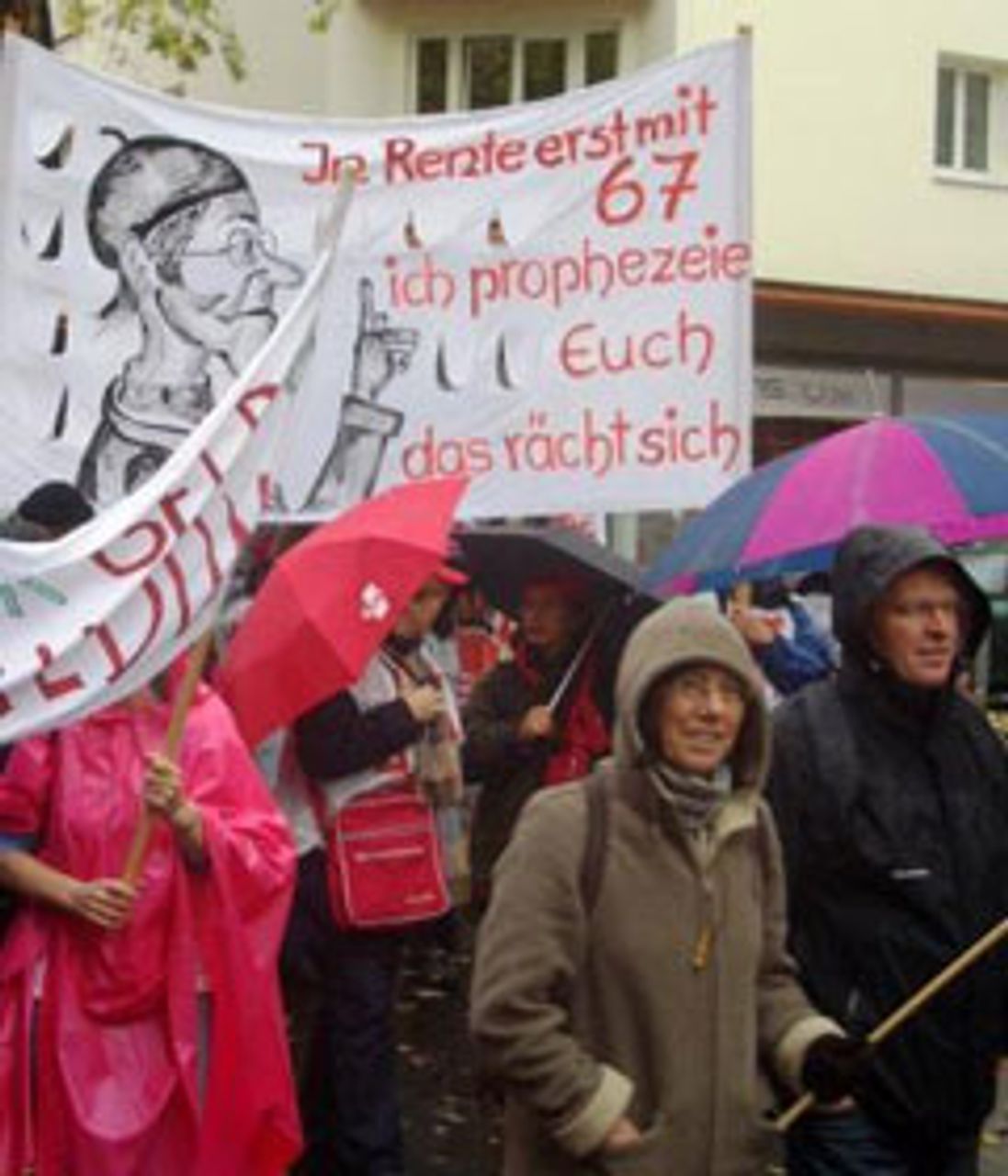 Teachers in Wiesbaden
Teachers in WiesbadenIn Wiesbaden, thousands of teachers joined the protests, although as officials they are banned from taking strike action. They held their own one-day strike, in which they demanded the withdrawal of an edict from the state premier, Roland Koch, forcing all officials in the state of Hessen to work additional hours.
In many cities, the local authorities responded to the demonstrations by mobilising squads of police to intimidate entirely peaceful protests. In Berlin, the police intervened aggressively with dogs and searched demonstrators as they sought to join the protest.
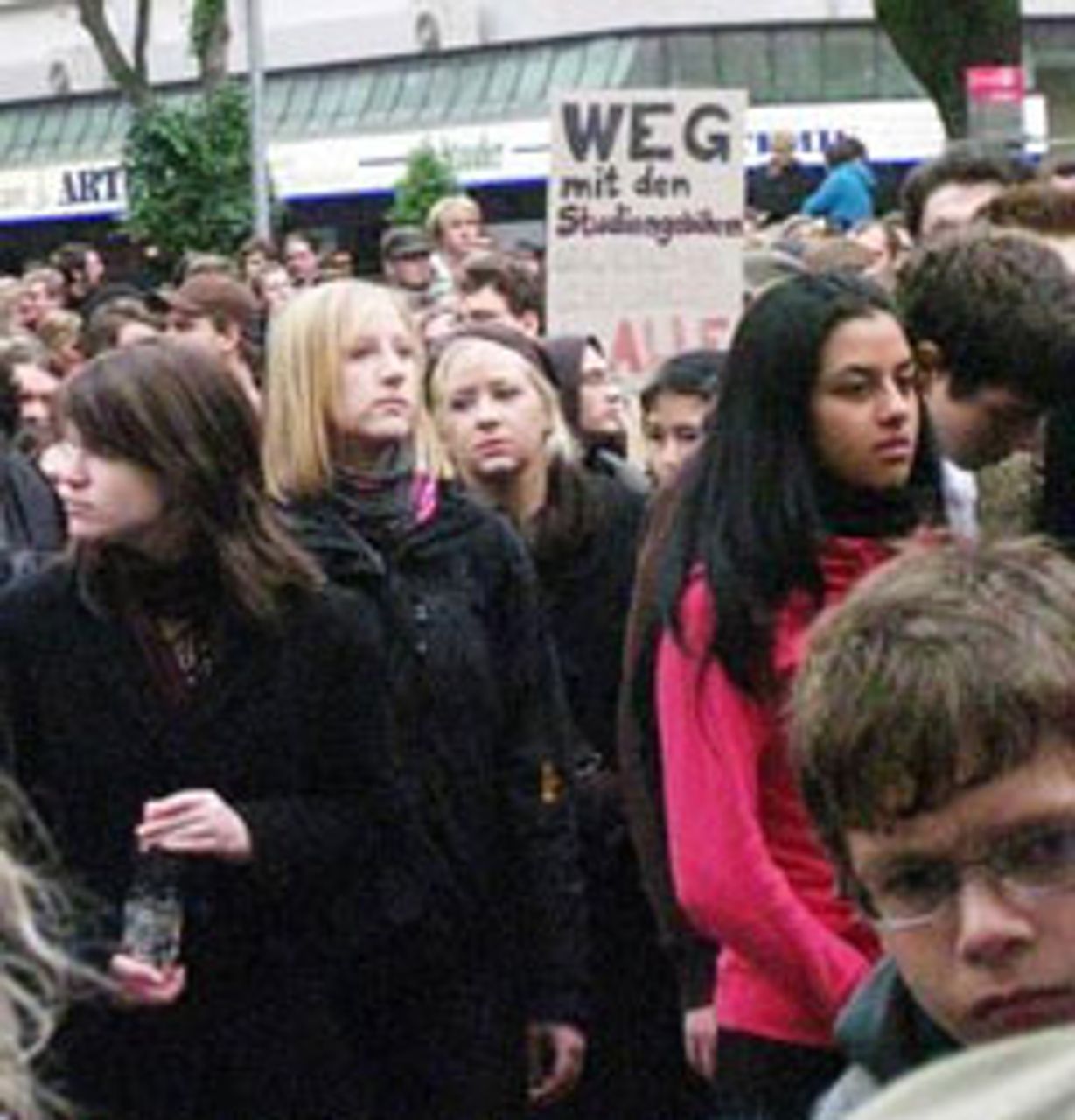 Demonstration in Essen
Demonstration in EssenIn Essen, the demonstration of 2,000 students was diverted by police through side streets, and friction developed between protesters and police at the end of the demonstration. The police called upon demonstrators to disperse; in front of the city hall, police took down details of more than 150 pupils and students, including 35 children. Those pupils and students over the age of 14 years are now threatened with being charged for unlawful assembly.
In Bielefeld, the demonstration of around 1,200 students was diverted by a huge police presence through the old part of the town. On Friday, police had forcibly evacuated the main auditorium at the University of Bielefeld.
In Berlin, around 12,000 students and pupils marched peacefully through the city centre. Following the lead in Austria, occupations had taken place at all of the capital city’s three universities, as well as at a number of schools.
Ironically, October of this year marked the 200th anniversary of the founding of the city’s renowned Humboldt University. A driving force for the founding of the university was the scholar and scientist Wilhelm von Humboldt. Two centuries later, thousands of students are protesting in order to defend the type of universal education advocated by the Humboldt brothers, Goethe, and other leading figures of the German enlightenment.
Politicians from all of the political parties initially sought to ignore the students’ demands and protests. In the meantime, many are indicating their sympathy for the movement, under conditions where there is a consensus in the bourgeoisie that the commercialisation of education and the moves towards a two-tier education system should go ahead.
